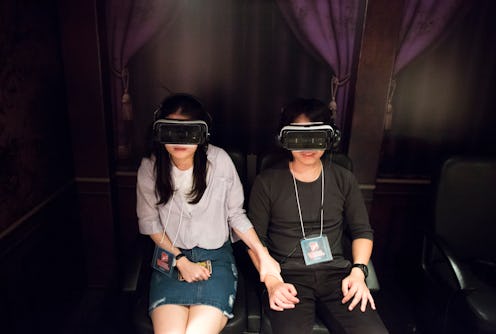Life
Unexpected Fields Virtual Reality Might Change Very Soon

These days, it seems like innovation moves a mile a minute. From the highly anticipated and rumored arrival of Google's self-driving car, to further optimizations in mobile and internet technology, to the ever-impending threat of robots swooping in and taking over our society, it seems like there's a new conversation in tech happening every day. For the novice consumer who barely understands the cloud, is always running out of storage, and has no idea how to update her phone (me, me, me, me, me ...), it can be a lot to keep up with. But with virtual reality (VR) and augmented reality (AR) more accessible to consumers than ever before, it's starting to seem like the tech landscape as we understand it might be shifting faster than we even realize. Especially when you consider the unexpected fields virtual reality might change in the next decade. Many of them aren't too surprising — for things like medicine, homeland security, and advertising, the effects of AR and VR are nothing new. But what about some of its more surprising conquers?
Whether or not AR and VR totally shake up these industries, one thing's for sure: they're bound to change how we think about them, how we do business with one another, and how we understand our world with so many new possibilities at hand. And while these are just a few of the industries that could see a shift, they're also some of the most widely used by consumers.
1. It Could Make The Real Estate Market More Competitive
It seems like one of the easiest target industries for virtual reality is real estate. Who wouldn’t want to slip on a headset and tour a property basically IRL?
2. It Could Transform How We Experience Music
We’ve already seen music festivals begin to stream their coverage to the remote masses. Could VR concert experiences be next? Think performances that really feel live, festival experiences, behind the scenes and backstage coverage, etc. The possibilities are endless.
3. It Could Make Us Rethink Interior Design
For designers reconfiguring a home’s aesthetic, virtual reality could make find the right color palettes and furntirure for the space that much simpler. Actually, it’s possible that advacned, systematic VR technology might do away for the need of a personalized designer altogether.
4. It Could Change How We Pitch Business
In the near future, business pitches could benefit from — or even be presented entirely with — virtual and augmented reality. VR/AR offer the benefit of an immersive experience, and for industries who rely on pitching ideas and selling concepts, the aid of a life-like addition could only help.
5. Nursing Homes Could Become A Lot More Fun
Hear me out: nobody wants to wind up in an old folks’ home, but what if were more hangout than isolation? VR could potentially offer residents and patients without families a change of scenery. All of a sudden, residents who never get visitors have a chance to ‘get outside’ the facility and see the world. What could be better than that?
6. Personal Trainers Could Become Obsolete
Because so much of the draw of personal training comes from having someone coach you on, demonstrate the moves, and motivate you to push harder, who’s to say virtual reality couldn’t one day do all of those things?
7. Virtual Dating Could Overthrow Online Dating
It’s possible that virtual reality is the next iteration of tech dating. Instead of swiping on someone who looks cute and hoping they live up to their hype IRL, imagine a world where you could virtually date them before meeting one-on-one … that’s to say, if you ever do at all. Maybe Joaquin Phoenix was onto something in the movie, Her; don’t be surprised if humans start using VR to develop simulated relationships in the near future.
8. It Could Change How We Buy Cars
Test driving the car has always been an integral, alluring step in the purchasing funnel for automotive, but what if test driving onsite wasn’t necessary? For luxury auto brands in particular, VR could help them circumvent this long-tail step in the sales cycle and move right into immediate sales.
9. It Will Likely Affect Travel And Tourism
With VR and AR making it easier than ever to experience a place firsthand, we could very well see a downshift in people paying for vacations in experiences. Imagine putting on a pair of VR goggles and experience an entire setting or city — not just for a few minutes, but for extended periods of time. It’s a somewhat far-fetched idea, but not entirely impossible, either.
10. It Could Change The Food Industry
Possibly the strangest concept to consider, but imagine how virtual or augmented reality could help burgeoning chefs and culinary students. Picture master classes taught be famous chefs, or even farming and agricultural courses taught via virtual reality. The addition of these technologies could make it easier for budding students to break into these industries.
11. It Could Rev Up Space Exploration
Simulated reality has long since been used to train for aviation and space exploration, but the benefit of augmented reality might unlock shortcuts to studying and understanding life outside of Earth's atmosphere. And in from a consumer's perspective, it might help up the ante on efforts to get civilians into space — or, on the flip side, alleviate some of that morbid curiosity.